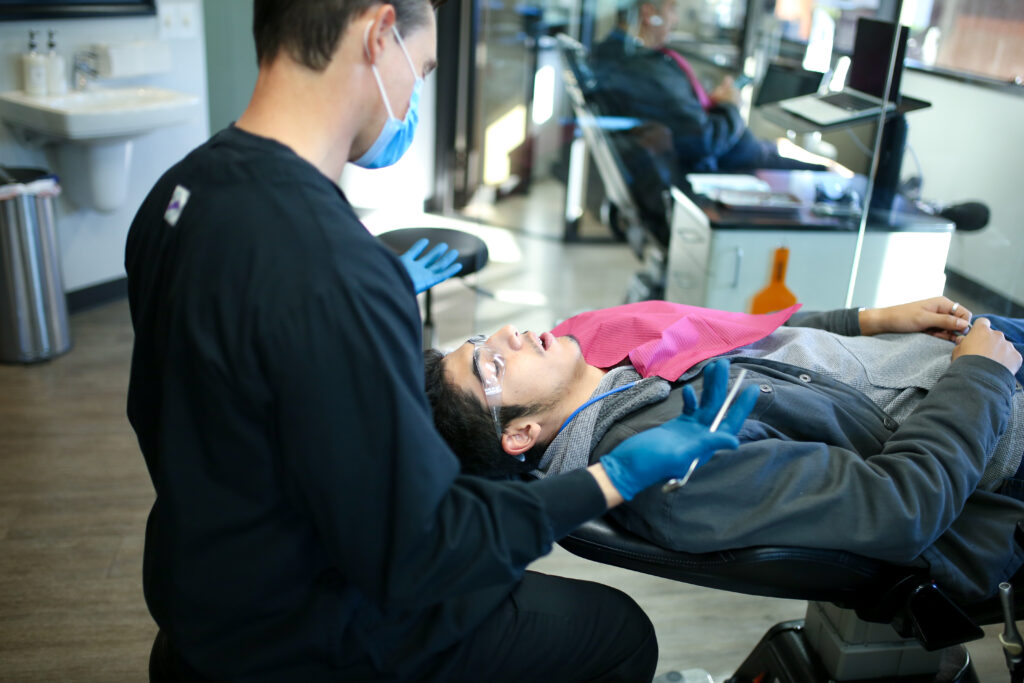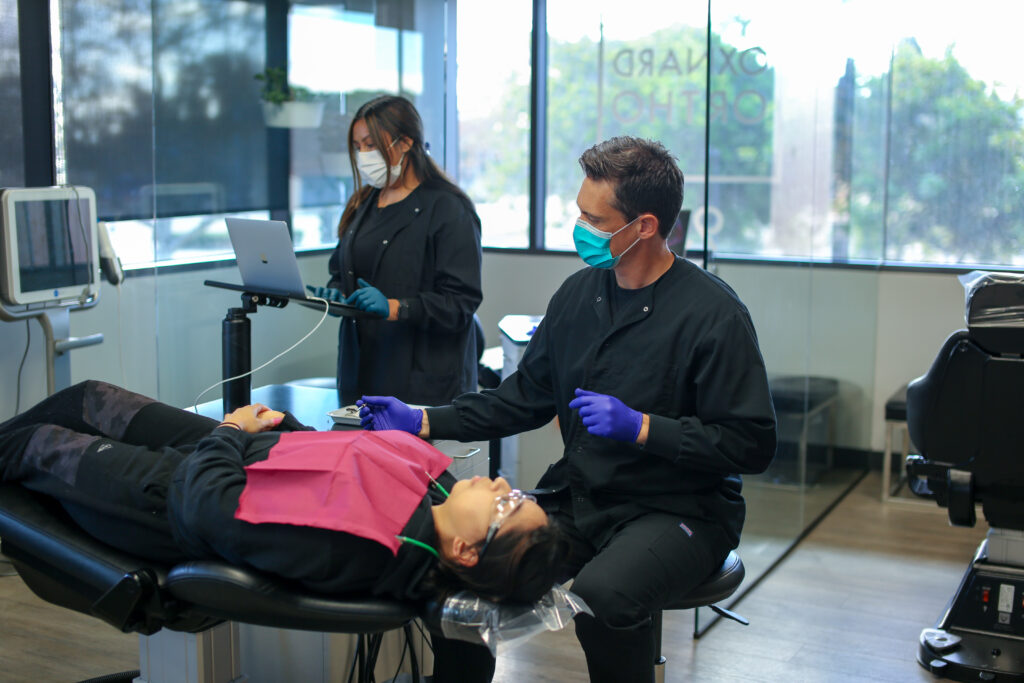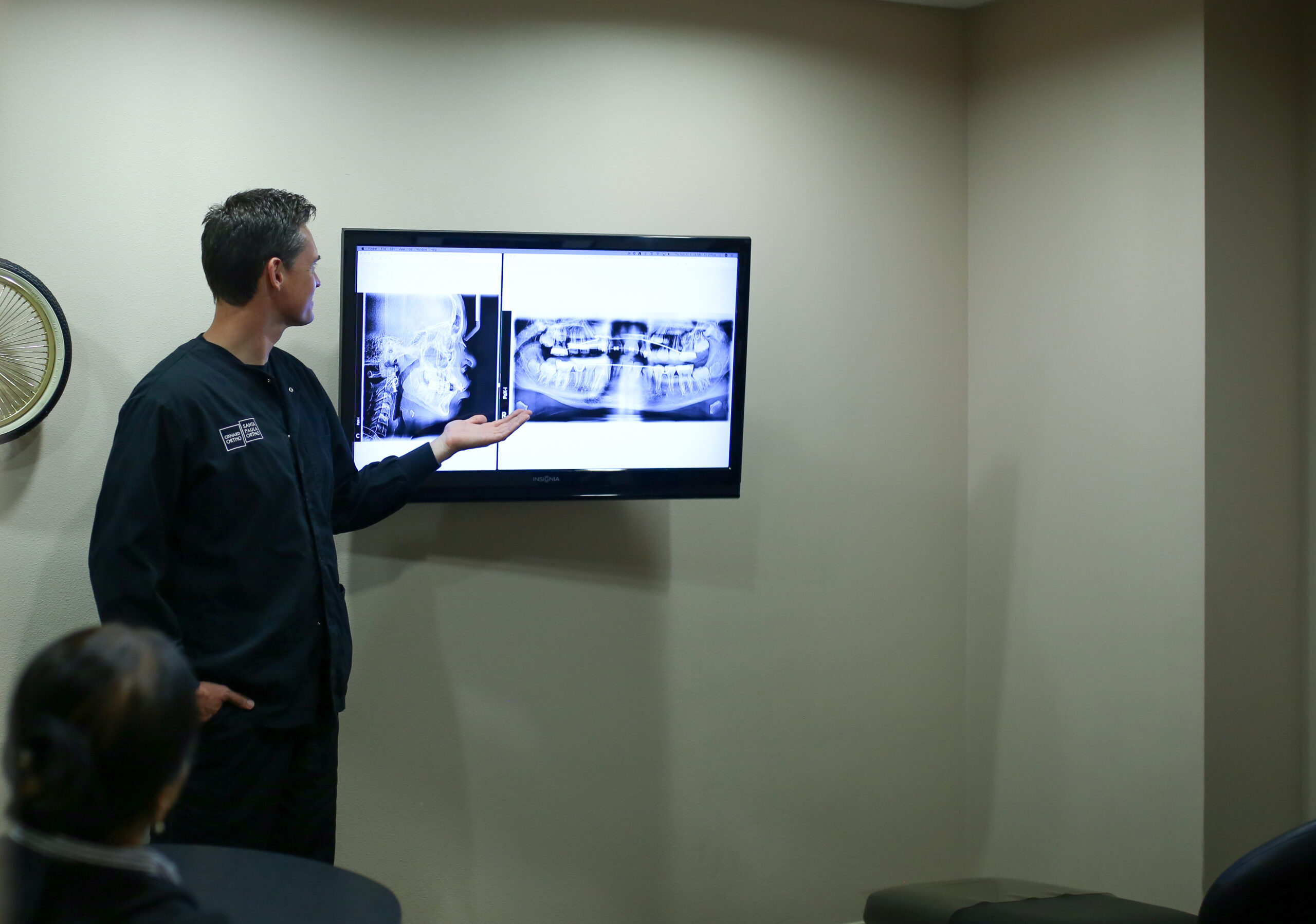Teeth grinding in your sleep, also known as sleep bruxism, is relatively common. Roughly 10% to 15% of people are affected. Sleep bruxism often operates stealthily, with many unaware they grind their teeth until symptoms emerge. To ensure our patients in Santa Paula and Oxnard maintain their healthiest smiles even when they’re asleep, Dr. Jared Lee has put together this sleep-bruxism crash course.
What causes it?
Sleep bruxism is a sleep-related movement disorder that can have various underlying causes. One primary physical trigger is dental issues, such as misaligned teeth or an abnormal bite. When teeth don’t align properly, involuntary grinding can occur as the body tries to find a comfortable bite position during sleep.
However, psychological factors often play a pronounced role, too. Elevated levels of stress or anxiety can lead to sleep bruxism. As individuals process these emotions during sleep, the body may grind their teeth as an unconscious coping mechanism.
Some lifestyle choices, such as consuming stimulants like caffeine or nicotine close to bedtime, can exacerbate sleep disturbances, potentially leading to increased grinding. Similarly, alcohol, which affects the depth and quality of sleep, can heighten the risk of sleep bruxism.
Certain sleep-related disorders are directly linked to sleep bruxism. Conditions like sleep apnea, where breathing is interrupted during sleep, can be accompanied by teeth grinding. Night terrors or restless leg syndrome can also contribute to this nocturnal habit.
Recognizing the specific cause of sleep bruxism is essential, as it paves the way for targeted and effective treatment strategies.
How do you know if you have sleep bruxism?
One of the most telling signs is the wear on the tooth enamel, leading to heightened sensitivity to temperature and sweetness. Some individuals might also notice flattened teeth. Beyond dental clues, an audible grinding sound at night, often pointed out by a sleep partner, is a clear indicator. Morning after-effects can include a dull headache originating at the temples, facial pain, or a tired or tight feeling in the jaw. In some cases, individuals might experience earaches without any actual ear problems. Being vigilant about these signs is essential, as early detection can prevent more severe complications.
What are the severe complications?
Chronic grinding can result in significant wear and tear on the teeth. Over time, this can lead to cosmetic concerns and structural damage, such as cracks or fractures in the teeth that are costly or painful to fix.
Your sore jaw in the morning is the joint that connects the jaw to the skull, struggling from the constant strain of grinding. This pressure can lead to a jaw joint condition characterized by pain, difficulty chewing, and even locking of the joint. Unfortunately, once developed, this condition lasts for a lifetime. There is no cure.
Consistently disrupted sleep due to bruxism can lead to frequent daytime fatigue and mood swings. Poor sleep can affect concentration, work performance, and mental health.
The pressure from grinding can lead to tooth decay and exposed roots, causing the loss of supporting bone or teeth falling out!

How can you stop teeth grinding in your sleep?
Sleep bruxism, while a concern, isn’t without solutions.
Orthodontic Options
Orthodontic treatments offer a promising avenue to address and alleviate the effects of nighttime teeth grinding.
- Orthodontic treatments: Braces or clear aligners can correct teeth and jaw misalignments, reducing the probability of grinding.
- Customized mouthguards: With a fit tailored to your dental structure, orthodontic mouthguards serve as protective barriers. They cushion your teeth during sleep, preventing the upper and lower sets from grinding against each other. Not only do they protect the teeth from wear and tear, but they also help minimize the strain on the jaw muscles and joints.
- Orthodontic surgeries: This is recommended for those with more pronounced cases of sleep bruxism. These procedures aim to rectify jaw misalignments or other structural issues that could be contributing to grinding.
Other Options
- Stress Management: Incorporating relaxation techniques, such as deep breathing exercises, meditation, or counseling, can help manage and reduce stress, potentially decreasing grinding episodes.
- Lifestyle Adjustments: Reducing the intake of stimulants like caffeine and alcohol, especially before sleep, can help. Additionally, establishing a regular sleep routine and creating a calming bedtime environment can be beneficial.
- Medication Review: Consult with your healthcare provider about your medications. They might adjust the dosage or recommend an alternative if they believe one or more of your medications are worsening your sleep bruxism.

Schedule A Free Consultation With Dr. Jared Lee Today!
It may feel overwhelming to combat a condition that causes issues when you’re sleeping, but that’s what we’re for! Dr. Jared Lee and his dedicated team are here to guide you every step of the way. With the right knowledge, proactive measures, and expert care, you can safeguard your smile and enjoy restful nights. If you think you or a loved one might have sleep bruxism, schedule a free consultation with Dr. Lee to take the first step towards a brighter, healthier smile.

